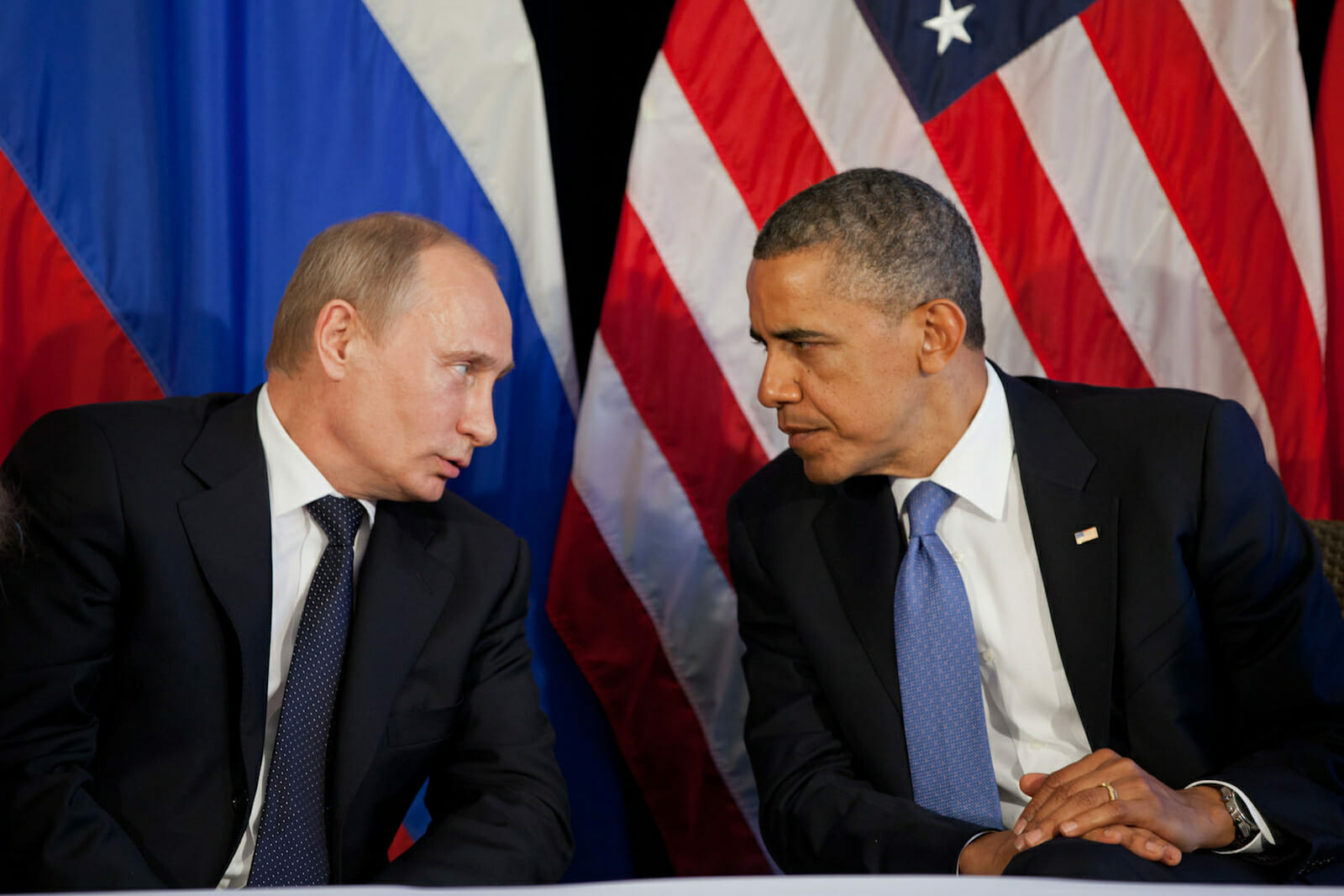
Time to Reset the Reset in U.S.-Russian Relations
“The relationship between Russia and the United States has suffered from a sense of drift. We resolved to reset U.S.-Russian relations so that we can cooperate more effectively in areas of common interest.” – Barack Obama
Regardless of which political party occupies the White House, American presidents are allowed a certain degree of latitude on foreign policy, where initiatives are not as constrained by Congressional oversight in comparison to the nation’s domestic issues. The absence of comprehensive oversight does not provide any Commander-in-Chief a blank check, however. Given the current chill between Moscow and Washington, we expect to see limited progress on the issues that confront both nations during Obama’s second term.
The Obama administration needs to find a way to refocus both nations’ policy interests, but it remains unclear how the United States will be able to achieve this objective. Should Washington create security guarantees with Moscow in order to diminish uncertainty? Or should the missile defense shield continue as planned to protect its European allies? Can common ground be found with NATO’s objectives, on Iran, and on Syria? Or is it the responsibility of the Obama administration to plot a new course – sans Russia – without completely alienating the Kremlin from possible cooperation?
U.S.-Russian ‘Reset’
Sergey Lavrov and Hillary Clinton sought to ‘reset’ bilateral relations following their first meeting in 2009. At the time Secretary Clinton suggested: “I am pleased by the opportunity that we had to begin a discussion on resetting U.S.-Russian relations, a process that we know will take time, but I think we had a very productive meeting of the minds on the range of issues that we will be addressing.”
“We will continue to work closely together in the coming months. There is a lot of work to be done. We think that this is a fresh start not only to improve our bilateral relationship but to lead the world in important areas, particularly with respect to nuclear weapons and nuclear security,” Clinton added.
The ‘reset’ has been duly criticized for its failings. The concept was undermined by a series of events: the arrest and subsequent conviction of Russian-national Viktor Bout over arms trafficking, the U.S. Congress passing the Sergei Magnitsky Rule of Law and Accountability Act this past summer, and the ‘outing’ of Russian nuclear scientist, Vyacheslav Danilenko, by the IAEA and the Washington Post, who had worked on development projects for Tehran’s nuclear reactors.
These incidents left the Kremlin feeling persecuted by the international community, and Russia’s reaction to these events – by limiting or denying access to USAID and foreign NGOs from operating inside its borders, and by generally seeking to flex its international muscles – has moved the entire ‘reset’ process into a form of diplomatic brinkmanship. Couple this with Russia’s historical support for Iran’s nuclear program and the West’s criticism of Russia over its ties to the Assad regime in Syria and Russia’s leaders no longer feels they are being treated with the respect of a world power – which has become a sticking point in the country’s national identity.
In reviewing the timeline that led to the ‘reset’ collapse, it is apparent that the entire process was dependent upon little more than the White House trying to win over the Kremlin, while at the same time being influenced by domestic politics. The Obama administration did not have the luxury of a clear path to hitting the reset button, as there was plenty of opposition among Republicans to the very idea. The perception that Mr. Putin may not have been entirely responsive to the idea of making a reset a reality did not help matters much.
The Obama administration’s belief that it could placate Mr. Putin into agreeing to new bilateral agreements for strategic cooperation and collective security turned out to be ill-advised and poorly timed. For Russia’s leadership, the spectrum of debate has become increasingly narrow, having been overtly tainted with nationalist themes that have negatively impacted progress on enhancing collective security agreements. Nationalism is, of course, alive and well in the U.S. as well, particularly as the economy continues to stagnate, enabling the far right in both countries to feed off each other.
The Cooperative Threat Reduction Program
Last month Russia turned down U.S. finances for the Nunn-Lugar agreement – commonly referred to as the Cooperative Threat Reduction Program (CTR) – which had been funded by the U.S. since 1992. The CTR began as a response to the fall of the Soviet Union and centered on securing the nuclear, chemical, and biological weapons in the former Soviet satellite states. The program – funded with $500 million per year – was developed to deny criminal organizations and violent non-state actors the opportunity to access the weapons and weapons-grade material that remained at poorly secured military sites. It came as a surprise to many international observers that Russia would hasten the program’s closure, but this is not the first time Russia has insisted that the CTR was a program from a bygone era.
The sentiment coming from Moscow that Nunn-Lugar had fulfilled its objectives does not accurately reflect reality, given that thousands of warheads and tons of chemical weapons remain undestroyed. Russia’s own economic uncertainty is beginning to undermine the country’s politico-military strategies. Some goals and objectives set forth by the CTR have been met, but a large amount of work remains to be done to ensure regional and international security.
The disconnect between the CTR program and Russia’s leadership stems from the differences between Moscow and Washington regarding what constitutes nuclear security. For Russia’s leaders, concerns over protecting nuclear stockpiles are not high on the country’s priority list, and the initiatives promoted for by the West have always been circumspect. Moscow’s leeriness of ulterior motives is matched by its concern of being perceived as weak, and accepting foreign aid for internal security matters weakens the perception that Russia is a strong international leader. This surely contributed to Russia’s decision.
What Nunn-Lugar was able to achieve – beyond designing and implementing security measures – is to bolster confidence between both governments and open a dialogue between scientists and academics in both countries. If the program is no longer continued, other avenues will need to be pursued to ensure that non-state actors do not have access to weapons-grade nuclear material. With U.S.-Russian relations at a low point and nothing designed to replace the previous CTR program, a new nuclear security program will not only need to be pursued but designed and implemented quickly.
Conclusion
The ‘reset’ failed for a variety of reasons, and in no small part due to disagreements over how to address Libya last year and the continuing crisis in Syria. It has been exacerbated by nationalist sentiments in both countries. Obama and Putin now have an opportunity to reset the reset – if they desire to do so. Surely, it is in their mutual interest to do so, but both men will need to placate the far right in order to do so.
However, according to sentiments expressed by President Obama, resetting U.S.-Russian relations is still feasible. During comments to the press following their first bilateral meeting in June following Vladimir Putin’s election, President Obama told reporters, “Over the last three years, the United States and Russia have been able to make significant progress on a wide range of issues, including the New START Treaty, the 1,2,3 Agreement, the work we’ve done on Russia’s accession to the WTO, and setting up a presidential process whereby issues of trade and commerce, science, technology are all discussed at a much more intensive level.”
“We agreed that we need to build on these successes, even as we recognize that there are going to be areas of disagreement and that we can find constructive ways to manage through any bilateral tensions,” Obama added.
Both men have fresh mandates and are experienced enough in the job to know what is in their own interest, and that of their nations. With Syria continuing to implode and a showdown with Iran looming, it is more important than ever that the U.S. and Russia find a way to work together in a meaningful manner for mutual benefit – and the benefit of the Middle East. It remains to be seen whether this can be achieved while both Syria and Iran remain unresolved, and such high priorities.
More likely, any meaningful progress on achieving a reset can only come after Syria and Iran have been more or less resolved. It is unclear whether this can occur over the next four years, but, presumably so. Assuming this, it would be useful in the interim to keep some momentum going and at the very least appear to be working at resetting U.S.-Russian relations.



